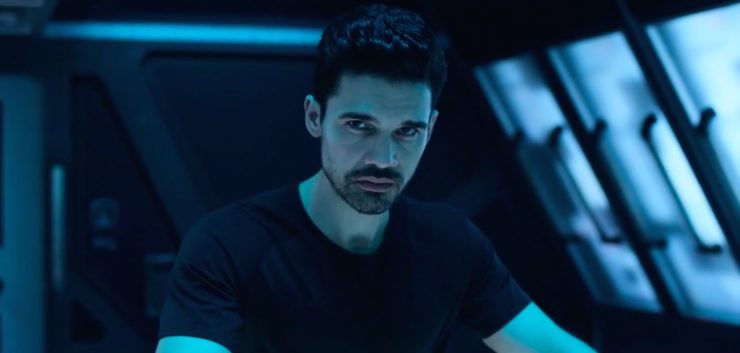If there’s one good thing about knowing that next season is the final season of The Expanse, it’s this: At least we know for sure there will be a next season. Season five’s bittersweet finale dramatically sets the stage for next season’s epic conflict—and there’s so much to talk about.
Spoilers ahead!
“Nemesis Games” feels like a two-parter in the span of just one episode’s worth of TV. There’s the first half, the stressful, daring rescue and mutiny, and there’s everything that comes after—the what now and the what next. But first: two captains, each preparing for a last-ditch, hail-Mary play for survival.
Holden kicks off this episode because what he says to Bull is central to everything: Holden will take responsibility for his actions, but he’s not the primary reason they’re facing a firefight they can’t win. Marco is. Holden’s explanation is a mirror image to what Marco does when he blames Naomi’s actions on Filip. Holden isn’t trying to pass the buck; he’s drawing back and locating the Roci in a much bigger picture. If Marco were willing to look at his own situation that way, he’d have to consider whether Naomi being on his ship was Marco’s own fault for taking Filip, all those years ago, and for starting a war. (Never gonna happen.) Bull doesn’t agree to Holden’s plan out of love, but because he wants to take the fight to the Belters. It’s the wrong reason, but how much does that matter when the outcome is the same?
So much of this season has been about exploring the ways that actions and choices can look similar on the surface but come from fundamentally different places. When is a mutiny the right thing to do? When is “this situation isn’t my fault” not an excuse? When is deadly force necessary and when is it unacceptable? There are no absolutes, except maybe that doing things out of love is often a better idea than doing them out of hate, or authority, or because you can. That’s the concept Holden starts from, and it’s the one Avasarala ends with before Marco reveals his knife in the darkness.
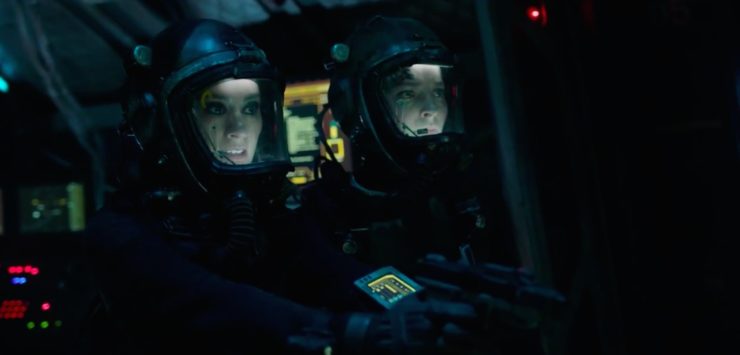
Meanwhile, our other captain is having an even worse day. I’m probably not the only person who shouted YES when Drummer finally took the inevitable action. I wanted this so badly, and yet it still hurt to see it play out the way we—and Drummer—knew it would: with the awful death of Serge, which we watch alongside the whole agonized family.
Buy the Book
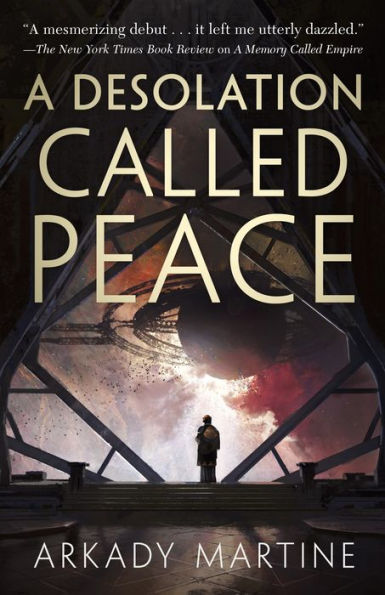

A Desolation Called Peace
Drummer couldn’t live with herself if she didn’t make this choice. Oksana can’t stay with her because she did. Oksana sees it as a trade: Naomi was more important to Camina than her new family’s safety. But nothing is ever that simple, and it was never just about Naomi. If it were, Josep wouldn’t have fired those missiles. Michio wouldn’t have smashed Karal with that fire extinguisher. They’re not just trying to save Drummer’s friend. They stay because they love her, and because they can’t smother their own beliefs and sense of what is right under Marco’s orders.
(Did Drummer shoot Oksana’s ship first in order to sell the lie to Marco’s people, or because she didn’t trust Oksana not to turn on her? A little of both?)
Drummer’s choices don’t have the clarity of Holden’s ideals, or of Marco’s self-interest. There’s so much to weigh, every time: to kill Marco or not to kill Marco. To stay or to split. To follow orders for the good of your family or to risk the family in the name of something better. There’s such contrast between her controlled, rigid appearance and the turmoil of her inner life—her mourning, her love, the ways she spits out, “Captain now. Camina later.” It’s what makes her so compelling, that layer of doubt, that conflict between wanting two things that simply can’t both happen. She chooses the best she can in any moment, and the consequences keep being deeply, crushingly personal. Doing the “right” thing is no guarantee that it won’t hurt like hell.
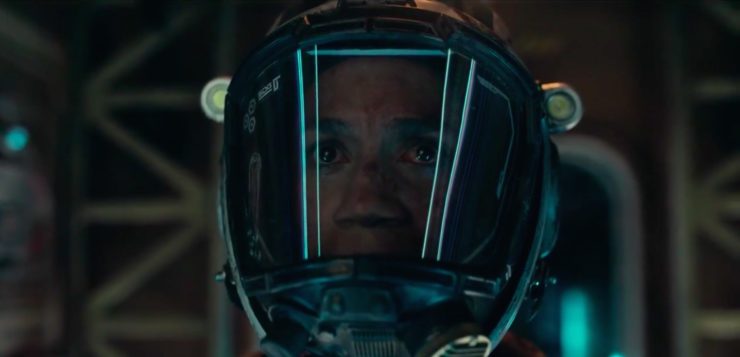
With the Roci and Drummer safe (for now), it’s time to rescue Naomi, whose second trip outside is even more stressful than the first. I knew she would be safe, and I still all but held my breath until Bobbie got to her.
Pour one out for all of us who wanted to see Bobbie Draper ride a missile like a surfboard; I’m sorry, friends, that it wasn’t meant to be. (I’m pretty sure the Razorback-turned-Screaming Firehawk doesn’t have any weapons.) But streamlining that rescue to keep our attention on Naomi was a brilliant, brutal choice. We’re with her, alone, not knowing what’s happening, spiraling in the depths of space, with no idea if or how rescue is on the way. And then Bobbie has her. But the camera stays on Naomi’s face, on that intense, overwhelming relief.
Of course, Bobbie’s lack of surf-missle isn’t the only difference in the rescue scene. I was curious why Fred Johnson’s manner of death was changed, and while there are probably several reasons, now I think I understand one of them: It would’ve been too much to have two people stroke out during high-G maneuvers. That’s how Fred goes out, in Babylon’s Ashes, but now it’s how they lose Alex. It’s not a surprise—it was announced that Cas Anvar wouldn’t be returning—and it fits. (The lingering shot of the Roci’s “legitimate salvage” plate is a graceful last moment to honor the character. Sorry, Alex; you deserved better.)
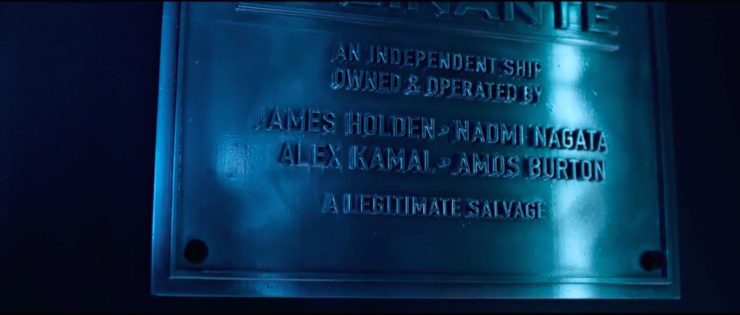
Holden confessing that he never listened to Naomi’s message broke my heart a little bit, and so did finally hearing it. I love that this show, which started out all space bioweapons and crotchety detectives, has allowed so much softness in. This season is intensely intimate and human-sized: the only enemy is us, and the only thing that matters is us. Holden has been the charging knight, the idealist who needs to save the world, but this season, he can’t. Steven Strait has a lot less to do than last season, and he lets Holden soften into that, into working from a place of loss and acceptance.
When Amos, Holden, and Naomi come together again, there’s no score, and it’s perfect. The silence is the absence they’re all feeling, and yet there’s so much comfort in their interactions, in Amos’s single “Yeah,” and Naomi throwing herself at him for a hug he doesn’t know what to do with. (I’m so glad to have their dynamic back on screen.) I don’t even know where to begin with Amos’s manner of asking Holden a favor; it basically amounts to “You don’t want to kill me anymore, so I’m gonna do something you won’t like at all and be real cheery about it.” Amos logic is not necessarily like our Earth logic.
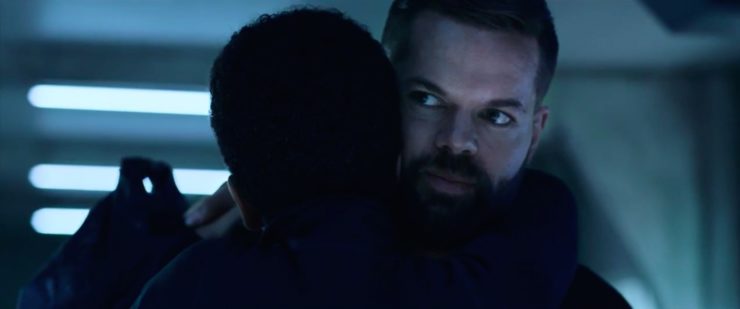
Avasarala is back in her element, though it’s hard to watch the folks on Luna enjoy a cocktail party while people are dying on Earth. But it’s what Chrisjen does: brings people together, introduces them, sets things in motion. And the normality, even if jarring, is needed. Her invocation of the Rocinante crew as the solution—replicating their bonds on a much larger scale—seems almost too nice, too kind, for the foul-mouthed politician. But she’s not wrong, and she’s mirroring what Holden says about Marco’s need to destroy the Roci and all it stands for. Do the opposite, magnify their symbol of love and cooperation and unity, and it will destroy Marco instead.
It’s all a very sweet moment that genuinely lets you believe that this is where we’re ending. A note of hope! Unity! A classic bittersweet closure that sees most but not all of our heroes safe and sound! An emotional if not yet practically laid out plan to defeat Marco!
Just kidding. The last moments of “Nemesis Games” belong to Marco, executing his next plan. (Filip does not have plans. Filip does not seem to have feelings. There is a lot going on with Filip that absolutely no one is privy to right now.) This time, there is no stopping him, because he’s a three-hour transmission delay away and there are rogue Martians playing for his team.
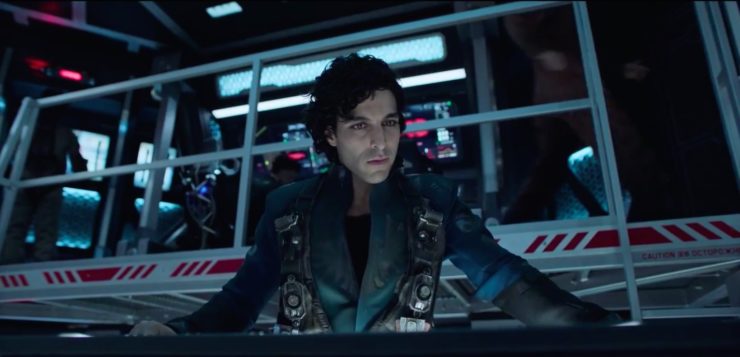
Putting this at the very end is deeply effective and deeply upsetting. Everything they’re seeing on their viewscreens has already happened. There is absolutely nothing they can do. And there’s so much the viewer knows that Holden and Avasarala and the gang do not—most horrifyingly, that Holden was right to fear that whooshy vision he showed Fred early this season. But also that after all this season’s intimacy and focus on the inevitable intersection of the personal and the political, we’re heading back to the existential threat of the protomolecule. Which Cortazar is just SO excited to play with again.
Without getting into anything spoilery, book six is a very different book. There are more perspective characters, more points of view spread across the system, and there’s so much action. Some of the plot has been pre-streamlined by Drummer’s role in this season, but there’s a ton left to cover, and so many dramatic peaks to climb.
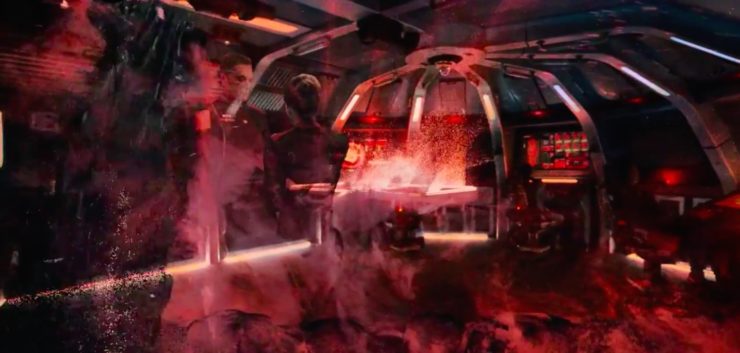
I’m so glad we got this more intimate season first, to bring everyone in close and explore all the things that they are to each other, and all the ways that relationships and connections drive better choices and actions. Even Marco, as a villain, is driven by interior, emotional things, by insecurity and fear and need for adulation and acclaim. What he says near the end is so telling: that generations to come will know that these things happened. They’ll know what he did. He doesn’t say the next generations will live better lives or never suffer, because it’s not about that. It’s about his desperate need.
I often find it hard to watch Marco’s scenes too closely. He’s a bully and a mass murderer and a snake (no offense to actual snakes) and I, uh, find myself yelling at the screen a lot. But he’s so hard to watch precisely because he’s not a cartoon villain twirling his mustache, but a man who is very good at convincing people of his version of reality. He’s the anti-Holden, far more charismatic, far less idealistic.
Holden, though, is growing up. His last line is an acknowledgment of ignorance, of the impossibility of knowing everything. He’s not the hero this season, because the season isn’t about heroes or about winning. It’s about loss and survival and better ways to do both, and about how those narratives also have so much value, so much to tell us about how people are. On screen, Nemesis Games translated into a stunning piece of work that builds on four years of experience, both for the characters and for the show’s creators. From the writing to the costumes to the constant blue glow of the Roci’s interior to the simple fact that we always know where everyone is on the giant canvas that is space, it’s a brilliantly structured and realized season.
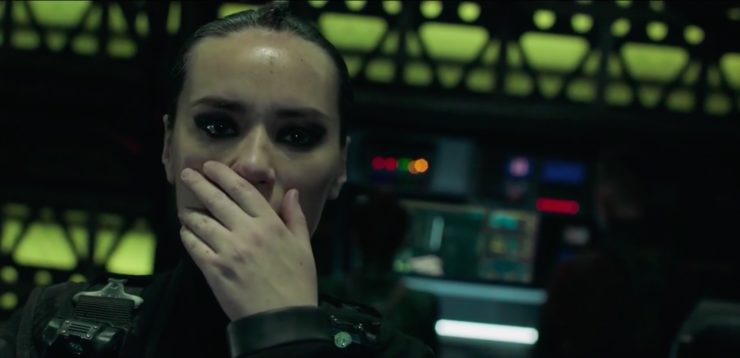
FLOTSAM AND JETSAM
- How did it take me this long to realize that Drummer is captaining from Ashford’s ship? My heart. My heart which also cracked at the relief in her voice when she says, “Holden. … This is Drummer.”
- Of course Monica figured out the Zmeya missile thing and of course she picked the most ridiculous moment to tell anyone else about it (also, her attempt to follow Holden with Avasarala was classic).
- Extremely disconcerted by Amos in plain old civilian clothes, standing around on Luna with nothing to do but try and fail to have a drink with Erich. (Why did I love that bottle slip so much?)
- Avasarala’s red party cape. That’s all. Look at her, back in her dramatic comfort zone.
- “Dishonorable discharge will be a bullet—or worse.” This is extremely ominous.
- Did you let the credits play? Before it cuts to black, the alien structure in the sky over Laconia is glowing blue.
- This episode, like last season’s finale, was written by Ty Franck, Daniel Abraham, and Naren Shankar, and directed by Breck Eisner—the same gang as last week. They’re a formidable team.
BOOK NOTES FOR BOOK NERDS
I haven’t wanted to dive too far into book-to-screen comparisons this season, simply because the adaptation was so good, and so much its own thing, that it was more fun to just see how it all played out without refreshing my memory about the book versions of things. But moving up Drummer’s mutiny—Michio Pa’s mutiny, on the page—into this season is a stroke of adaptation genius. The way it’s woven into Holden’s quest to save Naomi brings everyone together in an affecting payoff that’s bigger and deeper than the book version. Marco’s gaslighting and general shittiness is personal on more than one front. It’s not just Naomi whose experience demonstrates just what he’s capable of, but Drummer too. It’s all connected.
And now we’re somewhat beyond the end of Nemesis Games, though much of what we see at the end tracks with that book’s epilogue. Somehow, I was surprised by that cut to Cortazar on Laconia, but it makes sense: the protomolecule started all of this, for the crew of the Roci, and it will have to come in at the end, too. The dramatic ring transit at the end of Babylon’s Ashes is meaningful to our heroes and to this narrative arc, but to serve as a series finale, season six will have to bring in more Laconia than the sixth book does. There’s just no way that alien sky structure doesn’t light up and do something very bad that has repercussions all the way back to Luna and Earth.
Bring on the rampant speculation!
Molly Templeton lives and writes in Oregon, and spends as much time as possible in the woods. You can also find her on Twitter.










